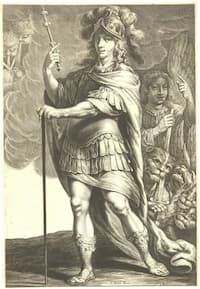Alexander the Great was king of ancient Macedonia (356-323 BC). He won the wars against Persia, a powerful enemy, and further expanded his power to India, establishing a vast empire. The cultural policies of his empire laid the foundation of Hellenistic culture. In his youth, he studied under the famous philosopher Aristotle. After his death, various legends have arisen.
Life of Alexander the Great
Alexander the Great was born the son of Philip II, king of Macedonia. From the ages of 13 to 16, he studied under the renowned Greek philosopher Aristotle. However, the specifics of his studies are not known.
In 338 B.C., Alexander participated in Battle of Chaeronea, where he won his good reputation. In 336 BC, his father was assassinated on his wedding day. In accordance with the custom of the time, Alexander was promoted by the army to the throne at the age of 20. Like his father, he became the leader of the Greek Confederation.
Therefore, Alexander began by pacifying the areas surrounding his country. In 335 B.C., he attacked and subjugated the Thracians in northern Macedonia. Around that time, a rumor circulated in Greece that Alexander had been killed in battle. Therefore, the Greek people revolted. Alexander attacked Greece and especially destroyed Thebes, the center of the revolt.
Persian Expedition
In 334 B.C., Alexander led the Macedonian and Greek armies to launch the Persian Expedition. It is said that the Persian expedition was revenge for the sack of Athens by the Persian army in the 5th century BC. They crossed the Dardanelles and fought the Persian army at the Battle of Granicus. He won the battle and liberated the Greek cities of Anatolia from Persian control.
In 333 B.C., Alexander confronted the Persian king Darius III directly at the Battle of Issus. This was a battle of major forces on both sides. The Persian army outnumbered Alexander’s army. However, Alexander won this as well.
Furthermore, in 332 B.C., Alexander captured the Phoenician cities. This led to the fall of the Persian naval base. He also marched into Egypt, which was under Persian control, and won a victory. He was welcomed by the Egyptians as a liberator from Persia. He was recognized and crowned as the successor to Pharaoh. He built Alexandria, a city named after himself.
Darius III tried to avoid further battles. He tried to conclude a peace treaty by ceding to Alexander all his lands west of the Euphrates River and paying him a huge sum of money in compensation. Alexander, however, refused the offer and continued the war.
In 331 B.C., Alexander again clashed head-on with the main forces of Darius at the Battle of Gaugamela. Again, he won. Darius fled. Alexander took Babylon. He also took over Susa, the capital of the Persian Empire, and acquired a vast amount of gold and silver. In 330 B.C., he captured Persepolis and burned down its palace.
Darius was then killed and the war with Persia ended. Thus, Alexander also became the ruler of the Persian Empire.

Alexander the Great
Further Eastern Expeditions
In 330 B.C., Alexander reorganized his army and marched to the Iranian plateau. He pacified Sogdiana. By this time, however, there was noticeable internal opposition to Alexander’s eastern policy.
In 327 B.C., Alexander finally reached India. The rainy season made moving difficult. Nevertheless, he marched as far as the Hydaspes River. But the soldiers refused to march any further. Therefore, they turned back to Susa. Alexander’s expedition to India would be recognized in East Asia as one that brought carnage and starvation.
In 323 B.C., Alexander moved to Babylon. He made it his new capital. As he was thinking about his next plan, he contracted a fever and died.
Posthumous Alexander
After his death, Alexander the Great became world-famous for the formation of this extensive empire. Alexander the Great would be mentioned or discussed in writings in a variety of languages from a variety of regions. Of course, he was also the subject of plays, novels, travelogues, and art. In the process, various legends arose that were not based on fact (e.g., the Persian legend that Alexander was of Persian royal blood).
Others tried to exploit Alexander’s achievements for political purposes. King Louis XIV of France in the 17th century was a famous example. He is known as the founder of the French absolute monarchy. He had the famous Palace of Versailles built as a royal palace. For its interior decoration, he had paintings and tapestries related to Alexander the Great created. The intention was to show that his own achievements in establishing the mighty French absolute monarchy were comparable to those of Alexander the Great.
Alexander the Great continues to attract interest today as the subject of television and film.
Recommended or Selected References
澤田典子『アレクサンドロス大王 』筑摩書房, 2020
大牟田章『アレクサンドロス大王』清水書院, 2017
Daniel Ogden(ed.), The Cambridge companion to Alexander the Great, Cambridge University Press, 2024